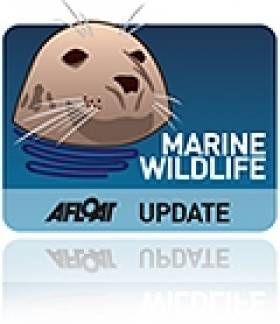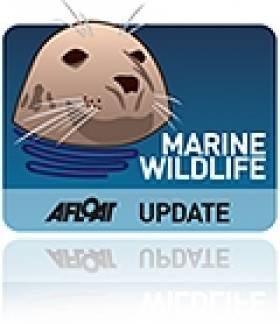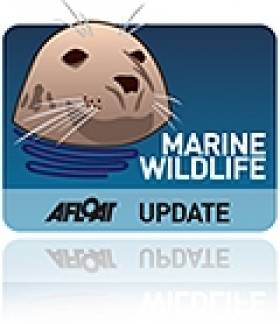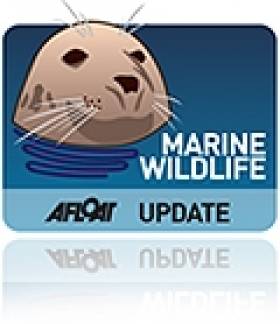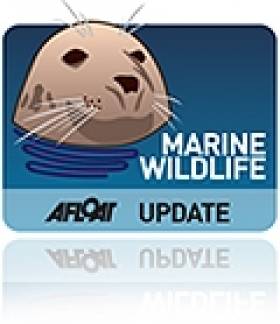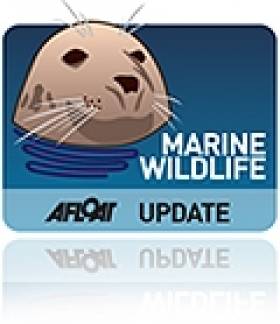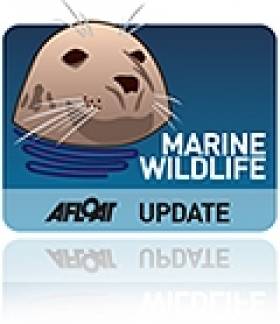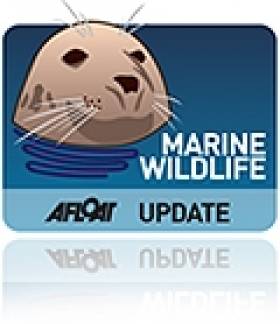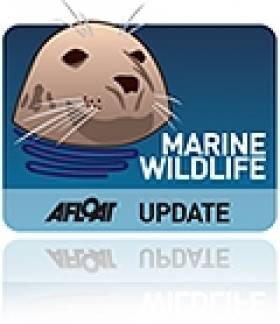Displaying items by tag: marine wildlife
New Research Says Sonar Sends Whales Scurrying
#MarineWildlife - The Guardian reports on new research which proves that military sonar has a direct effect on the behaviour of whales in our oceans - even leading to mass strandings.
The studies, part funded by the US Navy, found that beaked whales where particularly sensitive to sonar - and that even blue whales, the largest animals on earth, were distracted from feeding by the subsurface noise.
It's long been feared that the use of sonar is to blame for unusual behaviour among whales, who navigate and communicate with each other over long distances using sound.
As previously reported on Afloat.ie, the Irish Whale and Dolphin Group (IWDG) identified sonar activity by Royal Navy submarines as a possible cause of a the mass stranding of pilot whales in Donegal in November 2010, in which as many as 35 whales died.
Now for the first time, sonar has been proven to affect behaviour of cetaceans to a detrimental degree, confirming for many a connection between the use of sonar technology and recordings of whale and dolphin strandings identified since the 1950s. The Guardian has much more on the story HERE.
In more positive whale-related news, the IWDG reports that its next Cape Clear summer whalewatching course over the weekend of 26-28 July is "filling up nicely".
Places are still available but as it coincides with the tourism high season in West Cork, anyone interested is advised to book sooner than later to ensure they have someone to stay nearby.
The most recent weekend course over the June bank holiday witnessed numerous harbour porpoises and common dolphins, but its hoped the elusive whales will make an appearance next time round!
Rare Ocean Wildlife a Treat for Atlantic Explorers
#MarineWildlife - An Irish marine research vessel has returned from an Atlantic Ocean voyage with tales of exotic new wildlife in the depths southwest of Ireland.
As The Irish Times reports, remarkable finds such as two-century-old clams and oysters, an endangered sailfin roughshark, a massive sponge and a giant hydroid - a rare relation to jellyfish and coral - were among the marine wildlife recorded by researchers on the RV Celtic Explorer in the Whittard Canyon on the Irish Atlantic margin.
Dr Louise Allcock of NUI Galway, who led the Marine Institute team on the ocean survey, said it was "part of an ongoing effort to understand Ireland's deep-sea biodiversity".
In a similar process to that used by the group who made new marine discoveries at Rockall recently, the Marine Institute team used a submersible remotely operated vehicle (ROV) to collect images and samples from the ocean chasm that's twice as deep as the Grand Canyon.
Some of those samples may aid in antibacterial and pharmaceutical research, the team explained.
The Irish Times has much more on the story HERE.
In other marine wildlife news, the Belfast Telegraph fears that "chilly seas" could be keeping basking sharks at bay from Northern Ireland's waters, as the first sighting of the year was recorded last month.
Reports from various sources indicate that water temperatures are 2 to 3 degrees lower than normal for this time of year, inhibiting the blooming of plankton that are the main source of food for the second-largest fish in the sea.
And the numbers say it all, with the Irish Whale and Dolphin Group (IWDG) confirming only 19 sightings of basking sharks around the island of Ireland as of the end of May this year, compared to 84 in the same period in 2012 - although more were spotted earlier this month off Malin Head, as the video below shows:
Strange Case of Stranded Dolphin Found Two Miles Inland
#MarineWildlife - In a week that saw the Isle of Man's first sighting of a humpback whale for three years, BBC News reports on the strange discovery of a rare species of dolphin two miles inland from the shore in Co Donegal.
The carcass of an Atlantic white-sided dolphin was found on a hillside near Meenbanad with head injuries - but no one knows how it got there.
Pádraig Whooley of the Irish Whale and Dolphin Group (IWDG) said it's most likely that someone found the dead cetacean on the beach and took it to the hillside to decay so that its skeleton could later be retrieved.
The dolphin is thought to be one of a pod that beached at Traigheanna Bay in Dungloe on 21 June. The species is a rare sight in Irish coastal waters, said Whooley, because they tend to feed much further out at sea.
In other stranding news, the IWDG reports that a bottlenose dolphin who live stranded at Beal in Co Kerry last summer has been recorded in the Shannon Estuary with her calf on a number of occasions this month and last.
The Shannon Dolphin and Wildlife Foundation has more on the sightings of the dolphin they now call Sandy Salmon.
Isle of Man Sees First Humpback Whale In 3 Years
#MarineWildlife - BBC News reports that whale watchers in the Isle of Man have spotted the first humpback whale in the waters around the island since 2010.
Tom Felce of Manx Whale and Dolphin Watch confirmed the "very rare" sighting in the Irish Sea two miles south of Castletown last week.
It's an unusual location to spot one of these ocean giants, who are a regular sight off West Cork - but even cetacean spotters there have been surprised by changes in their activity as of late.
The west coasts of Ireland and Scotland lie in the humpback's usual migratory path from the cold polar waters where it feeds in summer to subtropical climes off North Africa where it breeds in winter.
BBC News has more on the story HERE.
Rockall Fishing Ban Recommended After New Marine Discoveries
#MarineWildlife - The Guardian reports that fishing is expected to be banned near Rockall after the recent discovery of a rare ocean floor gas vent and new species of shellfish.
The 'cold seep' methane vent found by Scotland-based marine scientists last year is only the third of its kind to be found in this region of the Atlantic Ocean - and apparently has a 'chemosynthetic' relationship with two species of deep-water clam, and the polychaete worms they contain, that are new to science.
Also found was a frilled shark, described as a 'living fossil' for existing as a species for at least 90 million years. Such sharks are seldom seen north of the tropics.
In the wake of these findings, the International Convention on the Exploration of the Seas has recommended a ban on fishing activity at the site and its surrounds.
Rockall - which adventurer Nick Hancock is attempting to occupy for a world record attempt - is a tiny rocky islet north-east of Donegal, almost halfway between Ireland and Iceland in the North Atlantic. It has long been the subject of territorial dispute, with Ireland, the UK, Iceland and Denmark all staking a claim.
The Guardian has much more on the story HERE.
Cillian Murphy Lands Plum Role In Maritime Movie
#AtTheMovies - The Irish Independent reports that Irish actor Cillian Murphy has signed on to appear in new maritime adventure film The Heart Of The Sea.
Ron Howard is directing the adaption of the Nathaniel Philbrick book, which follows the fortunes of the whale ship Essex and its encounter with an angry sperm whale in the South Atlantic.
Murphy - who previously narrated the award-winning surfing documentary Waveriders among his prestigious blockbuster credits - will play the ship's second mate.
The film also features Thor star Chris Hemsworth, and is set to begin shooting in the UK this September.
Killer Whales Surprise Angling Brothers Off Donegal
#MarineWildlife - Following the good news of the beached whale rescue in Co Meath today, the Irish Independent reports on a surprise killer whale sighting in Donegal.
Sea angling brothers John and Pat Cunningham described the "beautiful sight" of two orcas who emerged from the water by their rowing boat half a mile from the coast off Glencolmcille.
"I've only ever seen them in the North Sea when I was commercial fishing up there", said John of the unexpected rendezvous.
The Irish Whale and Dolphin Group's record of the sighting speculates that the killer whales may be the same pair spotted off Mizen Head in Cork on 11 June and Slea Head in Kerry a day later.
Killer whales are a rare sight so close to the shore but they are no strangers to Donegal - as last year's appearance of a well known orca pod in Lough Swilly demonstrates.
However, fears were expressed earlier this year that that particular family, often seen off the coasts of Scotland and Ireland, is on the 'brink of extinction'.
Whale Rescued In Meath Stranding Drama
#MarineWildlife - Skerries RNLI joined a number of groups in assisting a beached whale back out to sea at Gormanston in Co Meath earlier today (Thursday 20 June).
The volunteer lifeboat crew launched their inshore lifeboat shortly after 10am following reports from the Irish Whale and Dolphin Group (IWDG) that a 25ft pilot whale had beached in the area.
The lifeboat helmed by Joe May, and with crew members Emma Wilson, AJ Hughes and Laura Boylan onboard, made its way to the scene where May got into the sea and helped manoeuvre the whale back into deeper water.
Skerries RNLI then shadowed the whale guiding it out to sea, preventing it from turning back to shore by positioning the boat in its way. The lifeboat did this for about 25 minutes until the mammal was well clear of the shore.
Other agencies on scene included Skerries coastguard, the Defence Forces based at Gormanston, the IWDG, Boyne Fishermen’s Rescue and Irish Coast Guard helicopter Rescue 116.
Meanwhile, RTÉ News reports that a second whale was found dead on the beach near Mornington, north of Bettystown.
Despite initial fears that the whale was the same one rescued in the morning, it was later determined to be a different creature.
Shannon's First Recorded Dolphin Spotted Again 20 Years On
#MarineWildlife - The 21st year of dolphin research in the Shannon Estuary is off to an amazing start after the first ever dolphin recorded in the estuary was spotted on the Kerry coast.
As the Shannon Dolphin and Wildlife Foundation (SDWF) reports, the dolphin known as 'No 1' was sighted in Brandon Bay on Saturday 25 May swimming in a group of three.
No 1 is happily a familiar sight in the region, having been recorded most years since the project began in 1993.
"It has long been known that Shannon dolphins regularly use Tralee and Brandon Bays but how important the area is in not clear," says the SDWF on its blog. "If we are to protect the Shannon dolphins we need to ensure we identify all their important habitats and extend protection to these areas if necessary."
Meanwhile, its been confirmed that the trio of bottlenose dolphins who took up residence near Bunratty Castle in the spring have been observed in the mainstream of the Shannon Estuary.
The three were spotted on the first monitoring trip of the summer from Kilrush last week by SDWF researchers of Moneypoint.
"This demonstrates again the value of long term monitoring and the power of a photo ID catalogue to monitor the Shannon dolphins," says the SDWF blog.
In other cetacean news, an in-depth discussion of the Shannon's dolphins and the Irish Whale and Dolphin Group's (IWDG) research of bottlenose dolphins around the Irish coastline was broadcast on Derek Mooney's afternoon show on RTÉ Radio 1 recently.
A podcast of the 30-minute segment of Mooney Goes Wild from Friday 31 May is available to download HERE.
On the Radio: Trailing The Fin Whale
#MarineWildlife - Tonight's Nature on One on RTÉ Radio 1 joins the Irish Whale and Dolphin Group (IWDG) on a quest off Hook Head to find the majestic fin whale.
As TEN reports, Colin Stafford Jones was on board with the IEDG's Pádraig Whooley on a mission to track down the world's second largest animal - not only the biggest example of marine wildlife behind the incredible blue whale.
Their adventure will be broadcast tonight (Sunday 9 June) from 7pm on RTÉ Radio 1, and will be available to listen online afterwards via the Nature on One website HERE.


























